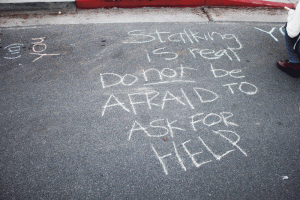
Morgan Bubman
Walking into the conference room of the Women’s Resource Center, the audience of a support event for survivors of stalking was packed with lots of friendly faces. The room was not filled to capacity but still had a decent turnout, with around nine women and five men. Before the presentation started, the group was offered an assortment of snacks, pamphlets, calendars, pins with cute feminist messages on them, CARE stress stars, and colored paper and markers by the Women’s Resource Center.
After giving everyone some time to socialize and grab food, two female students began the presentation, entitled “The Act of Solidarity.” Because the presentation was directed towards stalking, which can be a sensitive issue for many people, these women began by setting some guidelines. Participants asked to remain anonymous due to the nature of the topic.
The presentation guidelines were aimed at making the discussion productive, involving the use of “I” statements to avoid overgeneralizing, in addition to putting more emphasis on survivors of stalking instead of perpetrators. Organizers told the audience that the paper and markers were available to either take notes or sketch out potential ideas for when chalking Del Playa after the event.
The discussion was centered around the idea that stalking has very little to do with the perpetrator’s perceived or actual intentions, but rather how the victim is made to feel, although the term “victim” was stated to not be preferred. Stalking was said to be a widely experienced yet largely invisible issue because stalking tends to be normalized with social media terms such as “Facebook stalking,” in addition to the prevalence and romanticization of atypical behaviors in romance films, such as Twilight.
The students defined stalking as any repetitive behaviors aimed at making a person feel uncomfortable, including constant phone calls, text messages, giving of unwanted gifts, showing up where the person will be, breaking into their personal property, etc. The main takeaway from this definition is that these behaviors are unwanted and repeated and make the survivor feel uncomfortable or fearful.
The discussion leaders claimed that 600 people in Isla Vista alone would be stalked this year, especially concerning when told that Isla Vista only takes up around a square mile of space. Stalking is also widely ignored, according to organizers, because it is largely minimized by both survivors and their peers with statements such as “they don’t mean it like that!” or “they just like you, it’s cute!” Those who have experienced stalking also tend to blame themselves for these abusive and manipulative tactics that are centered around power and control.
After about 40 minutes, the slideshow ended with a slide dedicated to all of the confidential on-campus resources, such as CARE and CAPS, that provide support to those experiencing stalking or other forms of emotional abuse.
To end the event, the remainder of the group walked to Del Playa to write affirming messages in chalk on the street in support of Stalking AwarenessMonth. Some of the chalk messages included “We Believe (In) You,” “Shatter Silence,” and “Stalking Sucks.” The group as a whole was very supportive of each other and extremely friendly and open, regardless of the fact that many of them did not know each other.
 “It’s really important to have awareness for this issue because it’s so frequently made invisible in society and can come in so many different forms,” one student said when asked about the importance of “The Act of Solidarity” event. “It’s good to have these events to know that it’s not our fault and that it really does happen. People tend to blame themselves when they’re victims of this kind of manipulation and abuse and these events can help show solidarity, that you’re not alone, and can help build a community.”
“It’s really important to have awareness for this issue because it’s so frequently made invisible in society and can come in so many different forms,” one student said when asked about the importance of “The Act of Solidarity” event. “It’s good to have these events to know that it’s not our fault and that it really does happen. People tend to blame themselves when they’re victims of this kind of manipulation and abuse and these events can help show solidarity, that you’re not alone, and can help build a community.”
“The Act of Solidarity” was considered a hugely important event to those who attended. Many of the attendees either personally experienced or know someone who has experienced stalking. By having an informative group discussion about what stalking is, what behaviors are acceptable or not, and how to get help, this largely invisible issue was brought to light.
UPDATE
Feb. 28, 11:26 a.m.: A previous version of this article misspelled the writer’s name.










